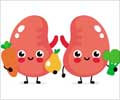Long-term functioning of transplanted kidneys is not possible if the kidneys are from donors with variants of a particular gene, reveals a study.

Researchers led by Barry Freedman (Wake Forest School of Medicine) looked for the potential link between APOL1 risk variants and shorter survival of transplanted kidneys in a larger group of patients. The new multi-center study included 675 deceased donor kidney transplants from African American donors.
Results from the study confirmed that 2 APOL1 gene variants in donor kidneys were associated with more than a 2-fold increased risk of organ failure after transplantation.
"These results warrant consideration of rapidly genotyping deceased African American kidney donors for APOL1 risk variants at the time of organ recovery," said Dr. Freedman. "APOL1 genotype data should be incorporated in the organ allocation and informed-consent processes."
Study: "Apolipoprotein L1 Gene Variants in Deceased Organ Donors Are Associated with Renal Allograft Failure" (Abstract TH-OR165)
Disclosure information is available at
http://www.asn-online.org/education/kidneyweek/2014/program-faculty.aspx.
Advertisement
The content of this article does not reflect the views or opinions of The American Society of Nephrology (ASN). Responsibility for the information and views expressed therein lies entirely with the author(s). ASN does not offer medical advice. All content in ASN publications is for informational purposes only, and is not intended to cover all possible uses, directions, precautions, drug interactions, or adverse effects. This content should not be used during a medical emergency or for the diagnosis or treatment of any medical condition. Please consult your doctor or other qualified health care provider if you have any questions about a medical condition, or before taking any drug, changing your diet or commencing or discontinuing any course of treatment. Do not ignore or delay obtaining professional medical advice because of information accessed through ASN. Call 911 or your doctor for all medical emergencies.
Advertisement
Source-Newswise












